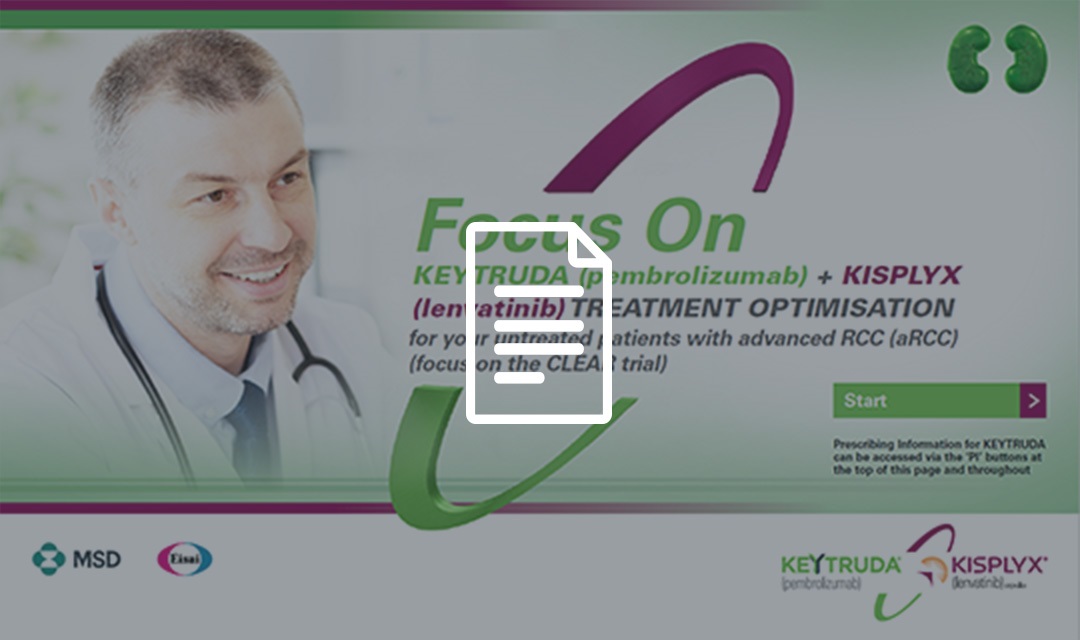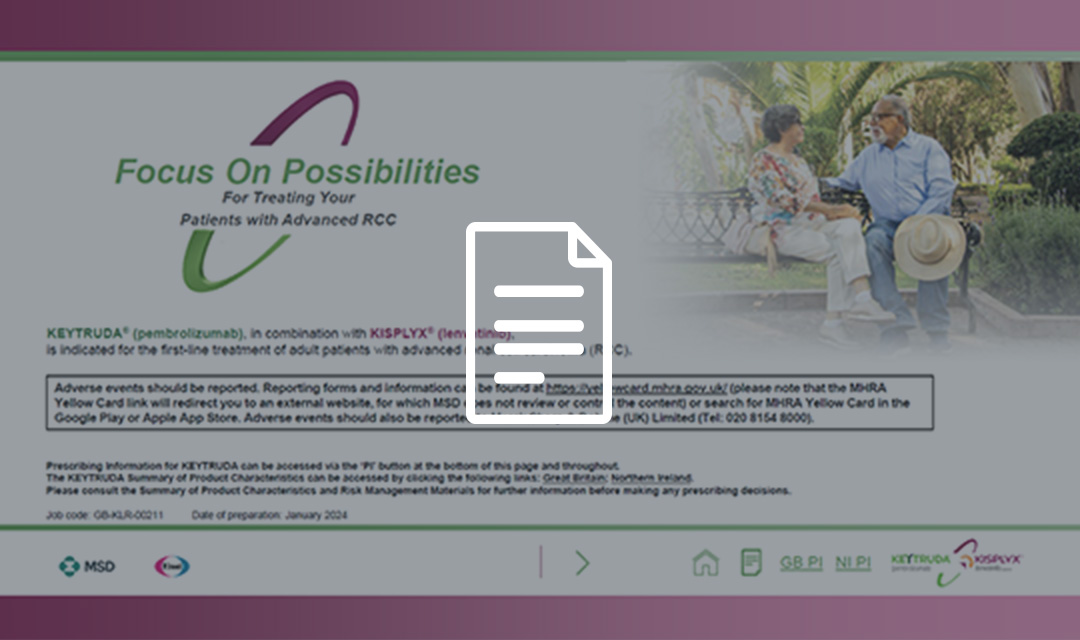Patient Case Studies

KEYTRUDA® (pembrolizumab) Prescribing Information [External links]
KISPLYX® (lenvatinib) Prescribing information [External link]
Patient case studies
Optimise treatment outcome for your 1L aRCC patients treated with KEYTRUDA® (pembrolizumab) plus KISPLYX® (lenvatinib)
Welcome to the advanced RCC KEYLearning Hub, learn from your fellow clinicians below as they describe their experiences of managing patients being treated with KEYTRUDA in combination with KISPLYX.
We estimate that the 4 case studies will take roughly 40 minutes to complete. Upon watching all videos you will find some additional documents and some reflection questions to review, which should take an additional 30 minutes to complete.
Please note you must complete all 4 case studies and reflection questions before downloading the CPD certificate.
KEYTRUDA, in combination with KISPLYX, is indicated for the first-line treatment of advanced renal cell carcinoma in adults.1
Please refer to the individual product SmPCs before prescribing.
Patient case studies in first-line advanced RCC
How to select first-line treatment for advanced RCC patient present with multiple metastases
Case study summary
Dr Ricky Frazer, Consultant Medical Oncologist at the Velindre Cancer Centre in Cardiff presents a case study of a 57 year old male with advanced renal cell carcinoma, treated with KEYTRUDA in combination with KISPLYX. This patient was diagnosed with multiple metastases (lung mets and large bone mets) and was classified as IMDC intermediate risk.
Dr Ricky Frazer, describes his treatment decision making, management of adverse events and the patient’s treatment outcome.
KEYTRUDA® (pembrolizumab) Prescribing Information [External links]
KISPLYX® (lenvatinib) Prescribing information [External link]
This content is intended to be viewed on laptop/desktop only.
Filmed: May 2023 | Length: 10:31
Symptomatic intermediate risk patient presented with Sarcomotoid features and bone metastases
Case study summary
Dr John McGrane, Consultant Clinical Oncologist at the Royal Cornwall Hospitals NHS Trust in Truro presents a case study of a 62 year old male with advanced renal cell carcinoma, treated with KEYTRUDA in combination with KISPLYX. This patient was diagnosed with sarcomatoid features and bone metastases and was classified as IMDC intermediate risk.
Dr John McGrane, describes his treatment decision making, management of adverse events and the patient’s treatment outcome.
KEYTRUDA® (pembrolizumab) Prescribing Information [External links]
KISPLYX® (lenvatinib) Prescribing information [External link]
This content is intended to be viewed on laptop/desktop only.
Filmed: June 2023 | Length: 11:22
Asymptomatic Intermediate risk patient presented with spinal metastases, pulmonary and adrenal nodules
Case study summary
Dr Richard Griffiths, Consultant Medical Oncologist at the Clatterbridge Cancer Centre NHS Foundation Trust presents a case study of a 61 year old female with advanced renal cell carcinoma, treated with KEYTRUDA in combination with KISPLYX. This patient was diagnosed with spinal metastases, pulmonary and adrenal nodules and was classified as IMDC intermediate risk.
Dr Richard Griffiths, describes his treatment decision making, management of adverse events and the patient’s treatment outcome.
KEYTRUDA® (pembrolizumab) Prescribing Information [External links]
KISPLYX® (lenvatinib) Prescribing information [External link]
This content is intended to be viewed on laptop/desktop only.
Filmed: June 2023 | Length: 09:23
AE management focus on hypertension
Case study summary
Dr Balaji Venugopal, Consultant Medical Oncologist at Beatson Cancer Centre in Glasgow, presents a case study of a 68-year-old male with advanced renal cell carcinoma, treated with KEYTRUDA in combination with KISPLYX. This patient was diagnosed with pulmonary and adrenal nodules and was classified as IMDC intermediate risk.
Dr Balaji Venugopal, describes his treatment decision and patient’s outcomes, focusing on how to manage the adverse events that emerged during the treatment, with special focus on hypertension management.
KEYTRUDA® (pembrolizumab) Prescribing Information [External links]
KISPLYX® (lenvatinib) Prescribing information [External link]
This content is intended to be viewed on laptop/desktop only.
Filmed: March 2024 | Length: 08:52
Thank you for watching all the videos
Please find below additional content to review before starting the reflection questions:
We encourage you to digest the content in the videos by reflecting on the following questions. We estimate this should take around 20 minutes.
- How would you define an eligible 1L aRCC patient for treatment with KEYTRUDA in combination with KISPLYX?
- Does this change for intermediate or poor risk , symptomatic or asymptomatic patients?
- Do the sites of metastases (lung, bone, liver, etc.) affect your decision process? After seeing the case studies, does this change your opinion?
- Are the incidence of AEs in your practice consistent with what you’ve seen in the videos?
- How do you identify and manage adverse events when prescribing this combination treatment?
- Considering any patients, you or your colleagues have seen in the past 12 months, do the case studies reflect your experiences with IO plus TKI in intermediate-risk patients?
- How do the case studies and real-world experiences with IO plus TKI influence your approach to discussing potential treatment outcomes and side effects with patients and their caregivers?
KEYLearning Feedback – aRCC – Patient Case Studies
Form to feedback on the module content, or recommendations for future modules.
This feedback form should not be used to report adverse events. Should you need to report an adverse event please follow the instructions provided in the footer of the page.
Reference
- KEYTRUDA Summary of Product Characteristics.
Supporting documentation
KEYTRUDA Prescribing Information
KISPLYX Prescribing information
By clicking the links above you will leave the MSD Connect website and be taken to an external website



